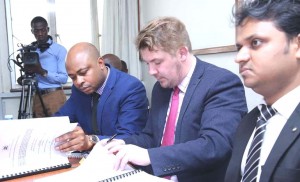Victoria partners with UK campus to teach oil expertise
January 31—Victoria University has gone into partnership with Coventry University, a British institution, to offer courses that will help Ugandans equip themselves with the knowledge to tap into the job vacancies that will be available as the oil and gas sector takes shape. A memorandum of understanding to that effect has been signed in Kampala.
The government wants to start commercial production by 2020, but an acute shortage of skilled and qualified people remains a problem. During mid-week, Dr. Krishna N. Sharma, the Vice Chancellor of Victoria University said, “It’s a big opportunity for Victoria University as we are ready to contribute to this so fast growing oil and gas sector. We need to build up the capacity of the Ugandans so that when the companies come, they don’t go out to look for human resources.”
The Vice Chancellor of Coventry University, John Latham, signed on behalf of the UK institution with roots going back to the 1840s. It presently has a student body close to 30,000 and hosts three Centres of Excellence. Coventry has also gained recognition for its research programmes. The new joint programme with Victoria is scheduled to begin within the two months. Victoria is part of the Ruparelia Group majority owned by Sudhir Ruparelia, one of Uganda’s wealthiest people.
Loy Mbaine Muhwezi, the Assistant Commissioner and Project Coordinator (skills development project) at the Ministry of Education and Sports said, “We came up with a work-post skills development strategy and plan which is for five years. We are now reviewing the curriculum to contain missing gaps so as our nationals are able to work in the industry.”
Not long ago, President Yoweri Museveni asked private sector institutions to step in and provide Ugandans with the necessary skills to benefit from the oil and gas industry. There is between 1.5 billion and two billion barrels of recoverable crude oil in western Uganda.
Speaking at a skilling-up forum, Museveni said instead of oil companies being the ones to build institutions and training Ugandans, local and international private companies, can set up institutions for training Ugandans. “This will help in separating the oil business from the skilling businesses. If we allow the oil companies to train Ugandans and deduct the money — once the oil is produced, it will reduce the final benefits. If there are institutions that can put up these technical institutes, then they should do it immediately,” he said.


 African Heads of state head to South Korea next week for Summit talks
African Heads of state head to South Korea next week for Summit talks
 Trading leads as main source of income for Ugandans
Trading leads as main source of income for Ugandans
 New leadership for bankers’ umbrella as total assets top $12 billion
New leadership for bankers’ umbrella as total assets top $12 billion
 Brussels Airlines to announce Nairobi service
Brussels Airlines to announce Nairobi service
 SITA promises enhanced travel experience after Materna acquisition
SITA promises enhanced travel experience after Materna acquisition
 Saudia’s 105 aircraft order stretches A320neo lead over rival Max
Saudia’s 105 aircraft order stretches A320neo lead over rival Max
